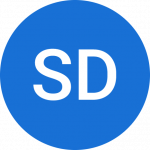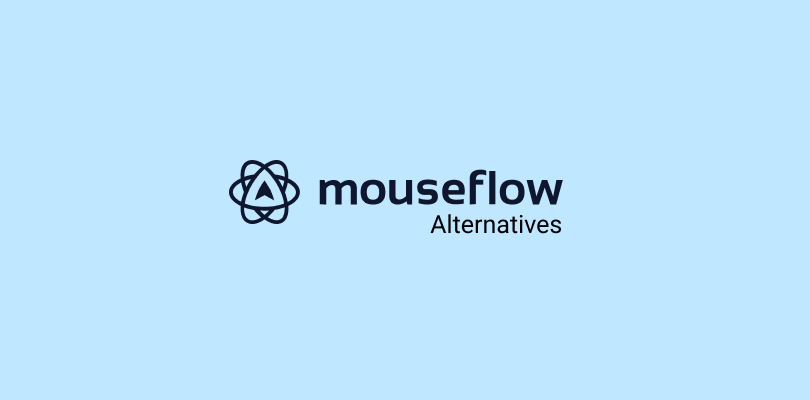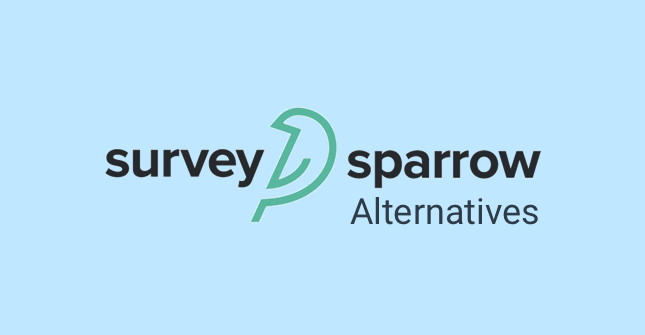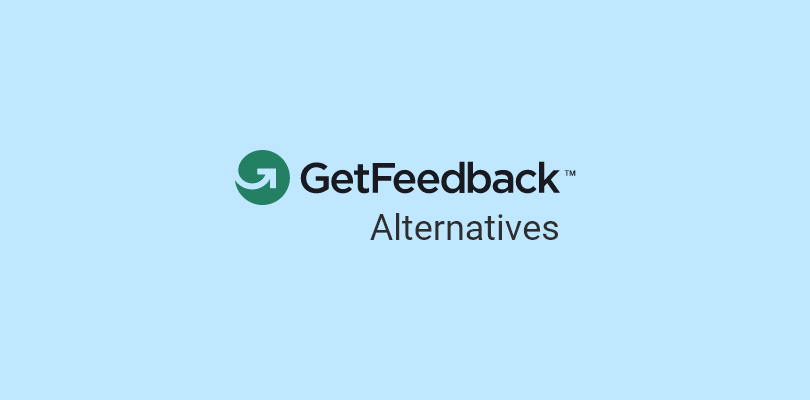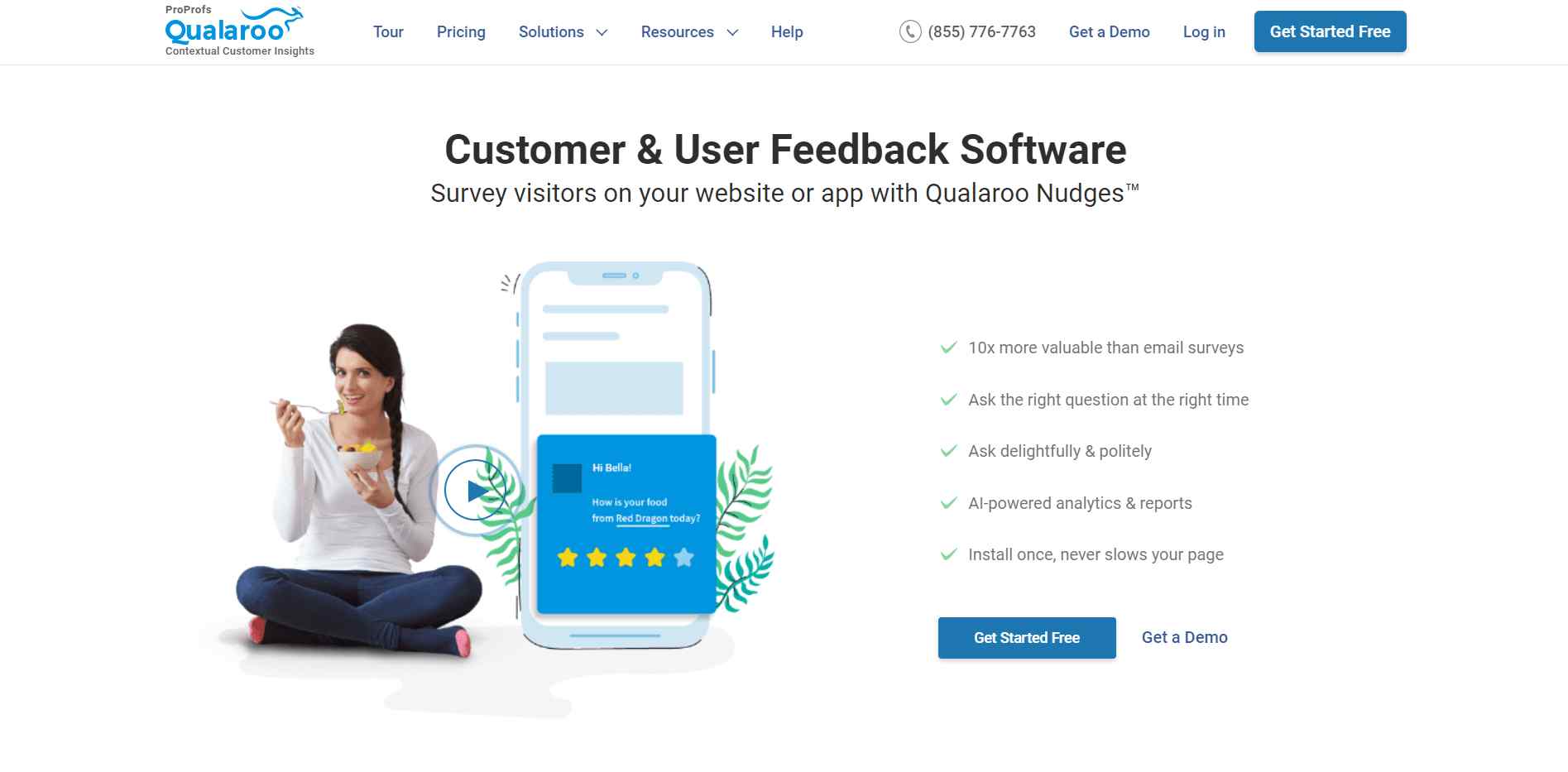Do you want to create stunning online surveys that get you tons of responses and insights? You’re in luck.
Today, I’m excited to share the top 10 SurveyLegend alternatives that will elevate your engagement levels.
While SurveyLegend is a popular online survey tool with great features, it may not meet all your requirements. Fortunately, many other online survey tools offer similar or even better features, functionality, and pricing.
Based on my hands-on experience, extensive research, and feedback from industry experts, I have compiled a list of the top 10 SurveyLegend competitors you can try today.
I’ve compared them with SurveyLegend pricing, features, and customer support, comparing their pros and cons. I’ve also included screenshots and links to their websites so you can easily check them out and see for yourself.
10 SurveyLegend Alternatives for 2026
I have carefully selected these tools and compared them with SurveyLegend for their performance, features, and usability. Let’s crank up your data game now!
1. Qualaroo: Best for User & Customer Feedback Surveys via Website or App
Qualaroo is my top SurveyLegend alternative for its unique features and how seamlessly it integrates into my workflow.
Qualaroo has a powerful feature called skip and branching logic, which allows me to create dynamic and personalized surveys that adapt to the user’s responses.
I can ask different questions based on the user’s answers and allow users to skip irrelevant questions. This way, I can get more relevant and accurate insights from my users without wasting their time or annoying them.
SurveyLegend also has skip logic, but it is not as advanced and intuitive as Qualaroo. With Qualaroo, respondents do not experience survey fatigue, and completion rates soar as they feel heard and valued.
What you’ll like:
- Diverse survey types such as NPS, CES, CSAT, and exit-intent.
- Pre-designed survey templates so you don’t have to start from scratch.
- Multiple question types to improve your lead generation process.
- Customizable NudgesTM to create white-label surveys.
- Advanced targeting with multiple trigger options to obtain actionable and contextual insights.
- AI-powered sentiment analysis to analyze user behavior automatically.
What you won’t like:
- Additional templates tailored to specific industries would be beneficial.
- The UI is too simple but effectively streamlines the survey-conducting process.
Pricing: Qualaroo offers a forever free plan for startups and small businesses with all premium features. Paid starts at $19.99.
Dig Deeper: A complete guide to skip Logic and Conditional Branching surveys
2. Qualtrics: Enterprise-level surveys with advanced features.
When it comes to collecting customer insights, accuracy and reliability are of utmost importance. Qualtrics has earned its place on my list of the best SurveyLegend alternatives for its exceptional ability to analyze open-text responses.
What truly sets Qualtrics apart as the best alternative for analyzing open-text responses is its Text iQ feature. Powered by innovative natural language processing (NLP) technology, Text iQ allowed me to delve deep into respondents’ open-ended comments and extract meaningful insights.
I could easily analyze sentiments, identify common themes, and understand the emotions and opinions expressed in the text. This level of analysis gave me a comprehensive understanding of customer feedback and empowered me to take targeted action.
What you’ll like:
- Advanced customization options to align surveys with your branding.
- Mobile-optimized survey design to reach a wider audience on the go.
- Advanced question branching to get accurate feedback.
- Easy integration with popular CRMs like Farlinium, Five9, Sinch, etc.
- Various question formats are available, such as matrics, multiple-choice, text entry, etc.
What you won’t like:
- Initial setup can be time-consuming for beginners.
- Advanced reporting features require some training to analyze the data.
Pricing: Custom pricing.
| Also Read: 11 Best Qualtrics Alternatives & Competitor |
3. SurveyMonkey: Professional surveys & in-depth analysis.
Image Source: SurveyMonkey
SurveyMonkey is an excellent SurveyLegend alternative, which helped me streamline my survey process and connect with my customers on a deeper level.
One thing I like about SurveyMonkey is its ability to design NPS surveys specific to my brand. It also supports customizable templates and allows me to ask follow-up questions.
The platform also empowered me to categorize respondents into Detractors, Passives, and Promoters, offering a nuanced understanding of my customer base. Plus, with the ability to track changes over time, benchmark against industry standards, and compare against competitors, SurveyMonkey provides invaluable insights for strategic decision-making.
What you’ll like:
- Online quizzes to test knowledge, skills, and competencies.
- Online polls to get instant results and visualize data in real time.
- Voice of the Customer (VoC) program to understand customer needs and improve retention rates.
- Net Promoter Score (NPS) to measure what makes your customers happy.
- Ready-made templates to quickly start your survey or form creation process.
- AI-powered guidance on question types and answer options to create smarter surveys.
What you won’t like:
- Not many options are available for survey designing.
- Each account is limited to only two devices.
- Difficult to navigate initially.
Pricing: Starts at $25/user/month.
| Recommended Post: 15 Best SurveyMonkey Alternatives With Pricing and Features |
4. Jotform: Best for Creating Kiosk Surveys
Jotform allowed me to create professional-looking forms without coding and integrate them with business apps, payment services, and more. I could easily collect and manage data from my customers.
But, when it comes to Kiosk surveys, Jotform is simply unbeatable. The unique kiosk mode feature of Jotform Mobile Forms transformed the way I collected on-site survey data.
With its touchless kiosk feature, participants easily provided feedback using the dedicated device installed across the location. The user-friendly interface ensured that even the least tech-savvy individuals could effortlessly share their thoughts.
What you’ll like:
- Pre-designed survey templates to save your time.
- CRM integrations with Zapier, Salesforce, Square, etc., to collect and manage customer data for improved customer relations.
- Conditional logic to make your surveys smarter by showing or hiding fields based on user input.
- Survey translation to reach a broader audience by offering surveys in different languages.
- Google Analytics survey tracking for in-depth survey analysis.
- Answer piping to personalize your surveys by piping previous answers into later questions.
What you won’t like:
- Dated and limited survey design options.
- The conditional logic feature is not as flexible as its competitors.
Pricing: Starts at $19.50/month. A free starter plan is available.
| Related Post: 12+ Best Jotform Alternatives & Competitors |
5. Sogolytics: Template-Based Surveys
Image Source: TrustRadius
After receiving a personal recommendation from my peer, I decided to explore Sogolytics as a SurveyLegend alternative. Having tested it myself, I highly recommend considering this software.
I found Sogolytics incredibly user-friendly, allowing me to effortlessly create and distribute surveys across various channels. It provided robust data analysis tools that enabled me to gain valuable insights from customer feedback.
What I liked about Sogolytics is its ability to transform data into visual presentations. It offers a wide range of visualization options, including bar graphs, area charts, pie charts, and radar charts.
Sogolytics also supports diverse reporting styles, from comprehensive statistical reports that include conventional metrics to comparative reports uncovering similarities and differences within datasets.
What you’ll like:
- Pre-designed survey templates to kickstart your survey creation process.
- Conditional logic to make your surveys smarter by showing the follow-up questions.
- Secure cloud storage ensures the safety and easy accessibility of your data.
- Estimate survey completion time to optimize survey response rates.
- Add media to your surveys to enhance survey engagement.
What you won’t like:
- The integration options are somewhat limited.
- Occasional disruptions occur during updates.
Pricing: Starts at $25/month.
| Check Out This Blog: 12+ Best Online Survey Tools to Gather Feedback |
6. SurveyLab: Best for Customer Segmentation
Image Source: G2
What sets SurveyLab apart and makes it one of the best SurveyLegend alternatives for customer segmentation is its ability to prioritize customer-centricity.
Through the feedback from SurveyLab surveys, I was able to segment my audience based on the questions I asked and their responses. I could define criteria and parameters for segmentation, allowing them to group customers with similar characteristics or preferences.
SurveyLab also comes with features that comply with ISO 9001 or COPC standards, enabling you to develop comprehensive customer segmentation strategies. It helps understand the customers better and make informed decisions.
What you’ll like:
- Advanced customization options to maintain your brand consistency.
- Multi-channel support allows for broader reach and collects responses from different sources.
- Automatic email notifications enable prompt response to new survey data.
- A secured 256-bit SSL HTTPS certificate ensures survey data privacy and security.
- Real-time graphical reports for immediate analysis and tracking of opinions and satisfaction.
What you won’t like:
- No facility to save the changes automatically.
- Sometimes, it takes a bit of time to load the survey pages.
Pricing: Starts at $49/month.
Read More: 8 Best Retently Alternatives for 2026
7.LimeSurvey: Best for Customer Satisfaction Surveys
LimeSurvey is the next great SurveyLegend alternative on my list. I tried this tool at the suggestion of one of my peers, and I was amazed to see that it’s an open-source survey tool, meaning I could modify it to suit my particular requirements.
I used it to create a customer satisfaction survey for a software development project I was working on. I aimed to gather feedback from clients and the end-users about their experience with the product.
I used the CSAT survey to measure their overall satisfaction with the software product and their satisfaction with specific features and benefits.
It’s free to use, with premium features available under a subscription.
What you’ll like:
- Intuitive user interface design for easier product navigation.
- Hosting options for customers to use its servers or opt for self-hosting.
- Comprehensive survey library to gather in-depth customer insights.
- Data analysis to organize feedback data into visually comprehensible formats like bars, charts, etc.
- Custom URLs for surveys for seamless shareability.
What you won’t like:
- It has a steep learning curve for some complicated features.
- It offers limited options for email handling.
Pricing: Starts at $34/month
8. Google Forms: Free & easy surveys for personal/business use.
Image Source: Teacher Yan
Google Forms has a simple interface that conceals powerful capabilities, making it an elegant and efficient tool for gathering information.
With Google Forms, I was able to create a set of questions that were tailored to extract the nuanced insights I needed.
The best part of Google Forms is that I was able to share my surveys on email and social media channels and reach the right people, no matter where they were located.
I collected and analyzed the responses using Google Forms’ real-time charts and graphs.
The insights I gained allowed me to test the demand and viability of my product idea and segment my target market.
What you’ll like:
- Randomized sequencing of questions within surveys to shuffle questions.
- One-time response feature that limits responses to once per user to ensure data integrity.
- Customizable themes allow your survey to be visually appealing and engaging for respondents.
- Auto-answer suggestions for surveyors to provide them with a seamless experience.
- File upload option to enhance the versatility of the survey forms.
- Instant reporting system that summarizes the collected responses.
What you won’t like:
- It offers very basic features for a survey tool.
- It lacks advanced data analysis features.
Pricing: Free
9. Hotjar: Website feedback with surveys & behavior tracking.
During my search for a better SurveyLegend alternative, I discovered Hotjar. Its heat maps feature caught my attention as it visually represents user interactions and online behavior by tracking clicks, movements, and scrolls.
In addition to heatmaps, I also enjoyed using Hotjar’s user feedback widgets. These widgets allowed me to gather feedback directly from my website visitors using surveys and polls.
As I experimented with Hotjar’s basic plan, I was impressed with its advanced targeting options that allowed me to segment my surveys based on user behavior, device, or location. This helped me gain deeper insights into their unique perspectives and preferences.
What you’ll like:
- NPS to gauge the likelihood of your customers recommending your product.
- Triggered surveys to gather insightful feedback at crucial moments.
- Streamline feedback to ensure it reaches the relevant departments for quick issue resolution.
- Feedback customization to align with your brand’s style and design.
- Filter session recordings based on behaviors, such as rage clicks and errors.
What you won’t like:
- Tracking users across multiple domains is not easy.
- Limited control over feedback widgets’ design.
Pricing: Starts at $32/month.
10. QuestionPro: Best for Churn Risk Analysis
QuestionPro is a fantastic tool that uses NPS to analyze customer churn. It has amazing features that make it stand out from the other SurveyLegend competitors.
For instance, it allowed me to co-create products and services with my customers, using their feedback and ideas to improve my offerings. It also helped me understand the root causes of customer churn by showing me NPS’ key drivers and detractors.
With its sophisticated predictive model that analyzes customer data and behavior, I could see which customers were likely to leave and why based on their responses.
It helped me prioritize my time, money, and efforts on the customers that matter the most and prevent them from churning.
What you’ll like:
- NPS survey questions to identify and address critical issues.
- Sentiment analysis to comprehend the emotions conveyed in customer feedback.
- Customizable dashboard to tailor reports to your specific requirements.
- Real-time shareable dashboard for swift data analysis.
- Customer journey mapping tool to pinpoint areas for enhancement.
What you won’t like:
- The integration process is a bit complicated.
- The pricing of QuestionPro might be on the higher side for small businesses.
Pricing: Starts from $99/month.
My Selection Criteria
To recommend the top 10 SurveyLegend alternatives, I took a comprehensive set of factors. My list provides you with a reliable evaluation of different criteria. Let me tell you;
The evaluation of products or tools chosen for this article follows an unbiased, systematic approach that ensures a fair, insightful, and well-rounded review. This method employs six key factors:
- User Reviews / Ratings- Direct experiences from users, including ratings and feedback from reputable sites, provide a ground-level perspective. This feedback is critical in understanding overall satisfaction and potential problems.
- Essential Features & Functionality: The value of a product is ascertained by its core features and overall functionality. Through an in-depth exploration of these aspects, the practical usefulness and effectiveness of the tools are carefully evaluated.
- Ease of Use: The user-friendliness of a product or service is assessed, focusing on the design, interface, and navigation. This ensures a positive experience for users of all levels of expertise.
- Customer Support: The quality of customer support is examined, taking into account its efficiency and how well it supports users in different phases – setting up, addressing concerns, and resolving operational issues.
- Value for Money: Value for money is evaluated by comparing the quality, performance, and features. The goal is to help the reader understand whether they would be getting their money’s worth.
- Personal Experience/Expert’s Opinion or Favorites: This part of the evaluation criteria draws insightful observations from the personal experience of the writer and the opinions of industry experts.
Which Is The Best SurveyLegend Alternative?
To help you better, I have narrowed down this list to provide you with my top 3 picks:
Option A: Qualaroo
If you want to get contextual insights, Qualaroo is the best option for you. It has the most sophisticated yet easy-to-use conditional logic that allows me to ask the right questions to the right people and get precise insights.
Option B: Jotform
If you need to create professional surveys without coding and integrate them with business apps, payment services, and more, Jotform is the tool for you. Its unique kiosk mode feature is also great for collecting touchless on-site survey data.
Option C: QuestionPro
If you want to increase customer retention, QuestionPro is the best option for you. This uses a unique methodology based on NPS to transform your survey data into a powerful organizational KPI, providing a holistic understanding of the impact on customer churn.
Overall, I think Qualaroo is the best among the 3 SurveyLegend alternatives you should try. It is more powerful, flexible, user-friendly, and also more cost-effective.
FREE. All Features. FOREVER!
Try our Forever FREE account with all premium features!
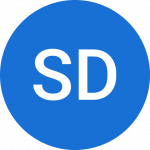
 We'd love your feedback!
We'd love your feedback! Thanks for your feedback!
Thanks for your feedback!

